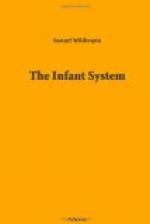Another plan which we adopt, is in practice almost every day; but it is better adapted to what is called the class-room: we have the alphabet printed in large letters, both in Roman and Italic characters, on one sheet of paper: this paper is pasted on a board, or on pasteboard, and placed against the wall; the whole class then stand around it, but instead of one of the monitors pointing to the letters, the master or mistress does it; so that the children not only obtain instruction from each other, but every child has a lesson from the master or mistress twice every day.
Before they go to the reading lessons, they have the sounds of all the words in spelling: thus the sound of a—ball, call, fall, wall; then the reading-lesson is full of words of the same sound. In like manner they proceed with other letters, as i—the sound of which they learn from such words as five, drive, strive, until, by a series of lessons, they become acquainted with all the sounds; and are able to read any common book.
I have observed in some instances the most deplorable laxity in this particular. Cases have occurred in which children have been for two years at school, and yet scarcely knew the whole alphabet; and I have known others to be four years in an infant school, without being able to read. I hesitate not to say that the fault rests exclusively with the teachers, who, finding this department of their work more troublesome than others which are attractive to visitors, have sometimes neglected it, and even thrown it entirely aside, affirming that reading is not a part of the infant system at all! Such a declaration is, however, only to be accounted for from the most lamentable ignorance, preverseness, or both. Had it been true, we should not have had a single infant school in Scotland, and throughout that country the children read delightfully.
The great importance of full instruction in reading will be apparent from the following considerations.
1. If the parents do not find the children learn to read, they will discontinue sending them. This they consider essential, and nothing else will be deemed by them an adequate substitute.
2. Children cannot make desirable progress in other schools which they may enter, unless they obtain an ability to read at least simple lessons.
3. Neglect in this respect impedes the progress of the infant system. Such an obstacle ought not to exist, and should at once be removed.
4. In manufacturing districts children go to work very soon; and if they are not able to read before, there is reason to fear they will not afterwards acquire the power; but if they have this, Sunday schools may supply other deficiencies.
5. Want of ability to read prevents, of course, a knowledge of the Word of God.




